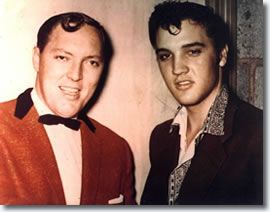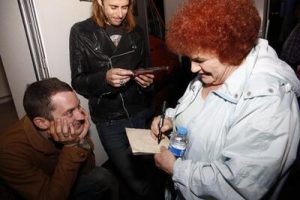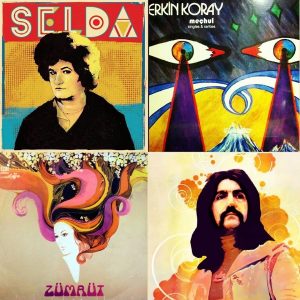Anatolian Rock Or Turkish ‘Psychedelic’ Music: A Brief History

Turkish psychedelic music, also known as Anatolian Rock, has started to attract more and more global attention over recent years. The increased popularity is thanks, in part, to a band called Altın gün based in Amsterdam. In need of tribute too, is the psychedelic influence this band had on Turkish folk music post-Grammy nomination circa 2019. The influences of the band date back to the years of 1960s and 1970, wherein the genre of psychedelic music began to first make its mark on the world.
Let’s dig into how Turkish artists fused this new genre into communities within their country back then and subsequently opened passages through which a new genre would begin to freely flow:

Anatolian Rock emerged with a newfound prominence after the recordings of Elvis Presley and Bill Halley started to circulate in Istanbul in 1956. (Gültekin,2019). This circulation made rock and roll relentlessly popular in Turkey and influence was something of an inevitability. Anatolian Rock music was a sort of east-west synthesis. Rather than being a mixture of European art music and Turkish music, Anatolian Rock was a mixture of Euro-American popular forms — particularly rock and roll– and Turkish music, played in conjunction with western (electric guitar, bass, trap set, Moog) and Turkish (bağlama, dümbelek, davul) instruments. (Karahasanoğlu& Skoog,2009)
Furthermore, Turkish folk music fusing with Western instruments was seen for the first time with Tülay German’s Burçak Tarlaları hit which was released in 1961.(Camgöz,2019). Burçak Tarlaları is arguably considered the first Turkish Anatolian Rock song. Ever since 1961, the synthesis of Turkish folk music and Western instruments has progressively assimilated, forming the tidal wave that is now classed as Turkish psychedelic music. The term Anatolian Rock was used for the first time by a band called Moğolla r– pioneers of this genre in Turkey. (Karahasanoğlu& Skoog,2009)
Erkin Koray, Cem Karaca, Selda Bağcan, Barış Manço, and Moğollar, Apaşlar and Kardaşlar were some of the artists and groups who made their debut during the late 1960s and well into 1970 within this cadre of musical advancement.(Karahasanoğlu& Skoog,2009). Barış Manço and Erkin Koray could especially be considered as some of the most popular figures contributing to Turkish Psychedelic music. For instance, Barış Manço’s Dönence is renowned in Turkey, easily taken as a vivid indicator/sample of Anatolian Rock. Similarly, Erkin Koray’s Bir Eylül Akşamı serves as a musical hybrid wherein Turkish and Western elements enmesh language, instrumentation, rhythm, melody, and harmony. (Lund,2013)

Although Anatolian Rock lost its popularity to Arabesque music in the 1980s, it has started to gain traction internationally again (an insurgence that spans post-2010s). For instance, American rappers such as Mos Def and Dr. Dre have used guitar riffs/solos by Turkish Anadolu Rock artist Selda Bagcan in their songs. (Sharpe,2018). Bagcan herself, now 70 years old, plays at festivals in Spain and the Netherlands with an international group of youngsters as her backup band. (Sharpe,2018). Moreover, American actor Elijah Wood –“The Lord of the Rings”– as well as musicians Annie Clark and Florence Welch have both stated publicly that they consider themselves fans of ‘60s Turkish rock.
Altin Gün, a band who interpreted Anatolian Rock music in their own way, caused Anatolian Rock music to draw a significant amount of global attention. The band was nominated at the 62nd Annual Grammy Awards (2019) for the Best World Music Album. (Havens,2021). The band would have gone on to perform at Coachella 2020 if Covid-19 had given the start of the decade a miss. Alas, no such luck. (Altın Gun Twitter,2020).

REFERENCES
Altin Gun. (2020). Twitter.Retrieved from http://twitter.com/altingunband/status/1213008475430817793
Camgöz.N.(2019) “ANADOLU TÜRKÜLERİNİN ANADOLU POPROCK MÜZİK TÜRÜNE UYARLANMASININ HALKBİLİMSEL İNCELENMESİ”(Doctoral Thesis,Istanbul University,Istanbul,Turkey).Retrieved fromhttp://nek.istanbul.edu.tr:4444/ekos/TEZ/ET001078.pdf
Gültekin, S. (2019).“TURKISH PSYCHEDELIA: THE REVIVAL OF ANATOLIAN POP”(Master Thesis,Kadir Has University, Istanbul, Turkey). Retrieved from http://academicrepository.khas.edu.tr/xmlui/bitstream/handle/20.500.12469/2771/Turkish%20psychedelia%20the%20revival%20of%20Anatolian%20pop.pdf?sequence=1&isAllowed=y
Havens, L.(2021). “Altin Gun on Why ‘It’s A Good Sign If You’re Hard to Classify”.Billboard.Retrieved from https://www.billboard.com/articles/columns/rock/9510801/altin-gun-new-album-yol-interview/
Karahasanoğlu, S. and Skoog, G.(2009). “Synthesizing Identity: Gestures of Filiation and Affiliation in Turkish Popular Music”. Asian Music, 40(2), pp.52-71.Retrieved from https://www.jstor.org/stable/25652426?seq=1&cid=pdf-reference#references_tab_contents
Lund H.(2013) “ Holger Anatolian Rock: Phenomena of Hybridization” Norient Network for Local and Global Sounds and Media Culture Magazine. Retrieved from https://norient.com/academic/anatolian-rock/
SHARPE, K.(2018).” Can Turkish psychedelic music go global?”.Al-Monitor.Retrieved from https://www.al-monitor.com/originals/2018/12/turkish-psychedelic-music-goes-global.html








lovely article about lovely music genre!
Thank you so much melike ,I indeed appreciate it :)))
As a Turkish psycdelic music lover, I really liked your article. Thank you for sharing.
Thank you so much nisa,glad that you’ve liked it 🙂